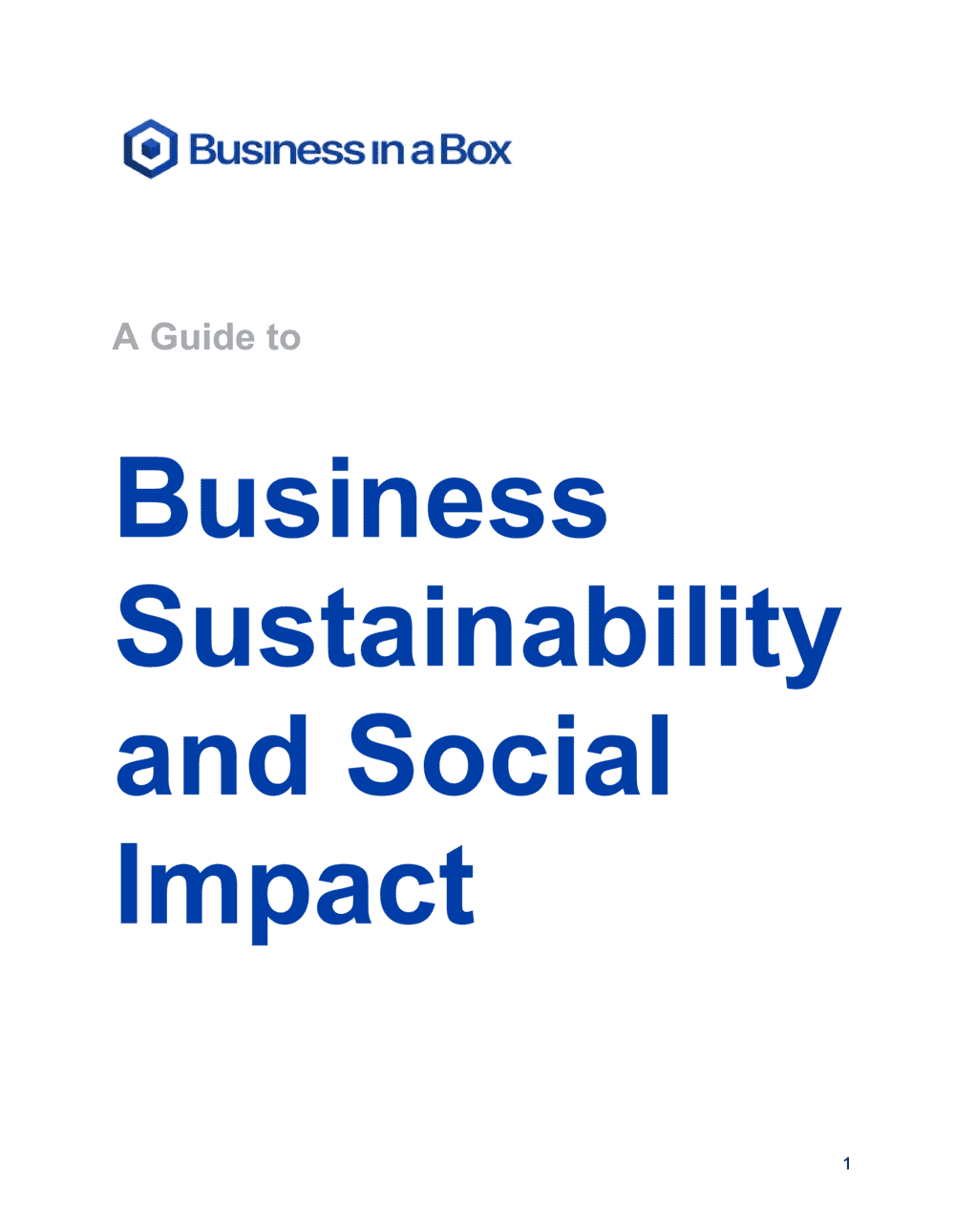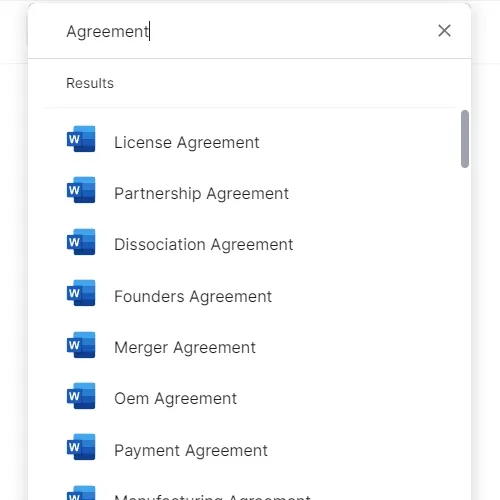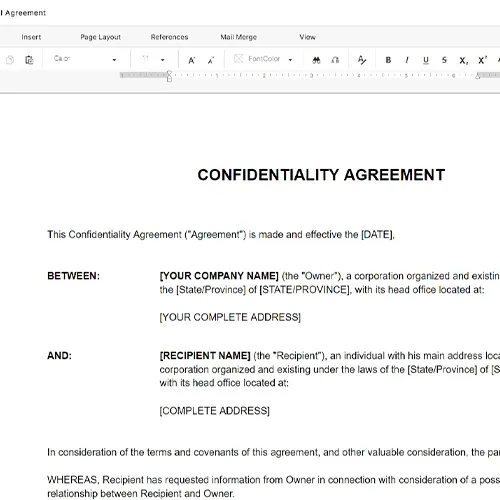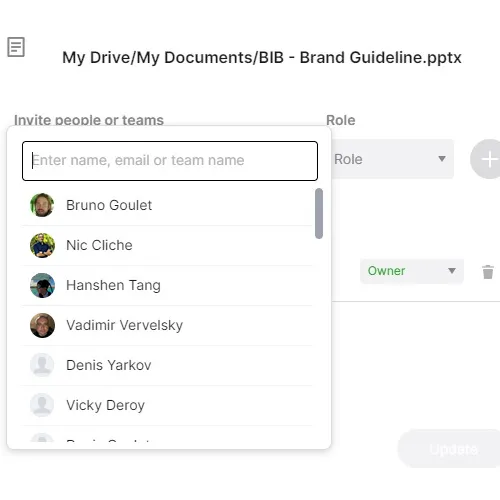Business Sustainability and Social Impact Guidebook

Document content
This business sustainability and social impact guidebook template has 54 pages and is a MS Word file type listed under our human resources documents.
Sample of our business sustainability and social impact guidebook template:
A Guide to Business Sustainability and Social Impact Table of Contents Introduction 3 Part One: Understanding 4 The Four Pillars of Corporate Sustainability 6 Sustainable Development Goals 12 How Do Business Sustainability and Social Impact Come Together? 15 Part One Summary 17 Part Two: Strategy 18 Strategies For Business Sustainability and Long-Term Success 27 Tools and Tips 38 Strategy Checklist 40 Part Two Summary 41 Part Three: Action 43 Business Sustainability and Social Impact in Practice 45 Monitoring, Reporting, and Adjusting Your Strategy 46 Action Checklist 48 Part Three Summary 49 Introduction In today's economy, sustainability and business success go hand-in-hand. Building a sustainable business is not only better for the planet and for your community, but it can also help you succeed financially. Consumers today have a strong social consciousness and want to shop at businesses that reflect their personal values. Recent research has shown that 58% of Americans describe themselves as "conscious consumers", and this number is even higher when looking at Millennials and Gen Z specifically. This means that businesses that commit to making positive change in their communities often have a very loyal customer base. Business sustainability practices also benefit your business internally. Sustainable businesses tend to have happier employees, which means less turnover and more productivity. In fact, 56% of employees say they are more likely to stay with an employer that has a sustainability agenda. Businesses that are developed with sustainable practices in mind from the beginning are often able to grow and change more effectively with time. But how do you build a sustainable business? Sustainability is a broad concept, and the process of implementing sustainable practices is going to look different for every organization. However, there are key components of corporate sustainability that can be applied to any business. In this guide, we're going to take a broad look at business sustainability, diving into key concepts and strategies, as well as the actions that you can take to implement them. Part One: Understanding What Is Business Sustainability? Business sustainability is an approach to business that minimizes harm to the environment and to society at large. This approach focuses on the long-term health and impact of the business rather than immediate or short-term goals. There are many different aspects to consider when developing a sustainable business strategy. Sustainability can look very different for different organizations, depending on what you sell, where you're located, and who your customer base is. Without a sustainable approach, businesses can have a negative impact on the planet - whether it's intentional or not. Unsustainable business practices can result in social and economic inequality in the communities they operate in, as well as damage to the environment. Why Are Business Sustainability and Social Impact Important? Businesses don't function in a vacuum. Even small businesses can have a big impact on the world in many ways. When every business does their part to operate sustainably, it creates a massive net positive change for their communities. On an environmental level, sustainable business practices help organizations reduce waste, minimize water and energy usage, and increase recycling, just to name a few things. Climate change has already started to affect weather around the globe. Eight of the warmest years on record have occurred in the last 25 years, and average winter temperatures have increased by 3 degrees Fahrenheit since 1896. This means it's even more important for businesses to think about how their practices impact the planet. Focusing on social impact also has huge benefits for the community around you. Sustainable and thoughtful business practices promote both economic and social equality in your community. Sustainability creates a more comfortable and inclusive shopping experience for customers of all backgrounds. Sustainability also promotes equality among employees, suppliers, and business partners you work with. Sustainable practices can also be hugely beneficial to your company from a financial standpoint. This is because sustainable practices actually reduce your business costs over time. There are many ways that this can happen. For example, installing solar panels can dramatically reduce your energy bills over time. Sustainable packaging options often cost less as well. Additionally, sustainable practices keep employees happy, which helps them work more productively and ultimately generate more revenue. Sustainability can also help to minimize employee turnover and the costs associated with it. On top of that, many modern consumers are specifically considering sustainability when making purchasing decisions. This means that operating sustainably can give you a competitive advantage, leading to more revenue and a more loyal customer base. Of course, it's not enough just to say you're sustainable - you'll need to prove through your marketing that you're actually making an impact. Additionally, many investors are also increasingly concerned with sustainability. As of 2020, sustainable investing accounted for approximately one-third of US assets under management. This is why it's so important to consider sustainability when developing your company's initial business plan. Thinking about sustainability from the beginning can help you attract funding and get your company off the ground. Regardless of what industry your organization is in, where you're located, or how big your business is, sustainability isn't something you can ignore. Sustainability benefits those around you and benefits your business, so it's a win-win for everyone involved. The Four Pillars of Corporate Sustainability There are four pillars of corporate sustainability that your organization will need to consider - environmental, human, social, and economic. All these components are equally important but affect our world in different ways. These pillars can also be intersectional. For example, environmental sustainability and social justice often go hand in hand. Marginalized groups tend to be more affected by climate change than privileged groups. Before your business can develop a sustainability plan, you will need to develop an understanding of these four pillars. With an understanding of these key sustainability components, you will be able to implement sustainability practices as part of your company's strategy. Social Sustainability The first of the four pillars is social sustainability. Social sustainability is a broad concept that can be difficult to define. It usually looks like promoting positive changes or initiatives in the communities you engage with. In many cases, social sustainability starts with your employees. A socially sustainable business would work with their employees to ensure that working conditions meet their needs. This collaboration with employees should be more than just a one-time survey or company meeting. To be truly sustainable, your employees should have input on an ongoing basis. There are many ways for a company to practice social sustainability internally. For example, the organization can work with employees to provide a flexible working schedule, with remote work opportunities when possible. This gives employees more room for work-life balance. Additionally, the company can offer an appropriate amount of maternity and paternity leave to ensure that their team members have enough time to spend with their families. Equality and inclusivity are also important components of internal social sustainability. Using equitable hiring practices helps organizations build a diverse and successful team of top talent
Reviewed on

Document content
This business sustainability and social impact guidebook template has 54 pages and is a MS Word file type listed under our human resources documents.
Sample of our business sustainability and social impact guidebook template:
A Guide to Business Sustainability and Social Impact Table of Contents Introduction 3 Part One: Understanding 4 The Four Pillars of Corporate Sustainability 6 Sustainable Development Goals 12 How Do Business Sustainability and Social Impact Come Together? 15 Part One Summary 17 Part Two: Strategy 18 Strategies For Business Sustainability and Long-Term Success 27 Tools and Tips 38 Strategy Checklist 40 Part Two Summary 41 Part Three: Action 43 Business Sustainability and Social Impact in Practice 45 Monitoring, Reporting, and Adjusting Your Strategy 46 Action Checklist 48 Part Three Summary 49 Introduction In today's economy, sustainability and business success go hand-in-hand. Building a sustainable business is not only better for the planet and for your community, but it can also help you succeed financially. Consumers today have a strong social consciousness and want to shop at businesses that reflect their personal values. Recent research has shown that 58% of Americans describe themselves as "conscious consumers", and this number is even higher when looking at Millennials and Gen Z specifically. This means that businesses that commit to making positive change in their communities often have a very loyal customer base. Business sustainability practices also benefit your business internally. Sustainable businesses tend to have happier employees, which means less turnover and more productivity. In fact, 56% of employees say they are more likely to stay with an employer that has a sustainability agenda. Businesses that are developed with sustainable practices in mind from the beginning are often able to grow and change more effectively with time. But how do you build a sustainable business? Sustainability is a broad concept, and the process of implementing sustainable practices is going to look different for every organization. However, there are key components of corporate sustainability that can be applied to any business. In this guide, we're going to take a broad look at business sustainability, diving into key concepts and strategies, as well as the actions that you can take to implement them. Part One: Understanding What Is Business Sustainability? Business sustainability is an approach to business that minimizes harm to the environment and to society at large. This approach focuses on the long-term health and impact of the business rather than immediate or short-term goals. There are many different aspects to consider when developing a sustainable business strategy. Sustainability can look very different for different organizations, depending on what you sell, where you're located, and who your customer base is. Without a sustainable approach, businesses can have a negative impact on the planet - whether it's intentional or not. Unsustainable business practices can result in social and economic inequality in the communities they operate in, as well as damage to the environment. Why Are Business Sustainability and Social Impact Important? Businesses don't function in a vacuum. Even small businesses can have a big impact on the world in many ways. When every business does their part to operate sustainably, it creates a massive net positive change for their communities. On an environmental level, sustainable business practices help organizations reduce waste, minimize water and energy usage, and increase recycling, just to name a few things. Climate change has already started to affect weather around the globe. Eight of the warmest years on record have occurred in the last 25 years, and average winter temperatures have increased by 3 degrees Fahrenheit since 1896. This means it's even more important for businesses to think about how their practices impact the planet. Focusing on social impact also has huge benefits for the community around you. Sustainable and thoughtful business practices promote both economic and social equality in your community. Sustainability creates a more comfortable and inclusive shopping experience for customers of all backgrounds. Sustainability also promotes equality among employees, suppliers, and business partners you work with. Sustainable practices can also be hugely beneficial to your company from a financial standpoint. This is because sustainable practices actually reduce your business costs over time. There are many ways that this can happen. For example, installing solar panels can dramatically reduce your energy bills over time. Sustainable packaging options often cost less as well. Additionally, sustainable practices keep employees happy, which helps them work more productively and ultimately generate more revenue. Sustainability can also help to minimize employee turnover and the costs associated with it. On top of that, many modern consumers are specifically considering sustainability when making purchasing decisions. This means that operating sustainably can give you a competitive advantage, leading to more revenue and a more loyal customer base. Of course, it's not enough just to say you're sustainable - you'll need to prove through your marketing that you're actually making an impact. Additionally, many investors are also increasingly concerned with sustainability. As of 2020, sustainable investing accounted for approximately one-third of US assets under management. This is why it's so important to consider sustainability when developing your company's initial business plan. Thinking about sustainability from the beginning can help you attract funding and get your company off the ground. Regardless of what industry your organization is in, where you're located, or how big your business is, sustainability isn't something you can ignore. Sustainability benefits those around you and benefits your business, so it's a win-win for everyone involved. The Four Pillars of Corporate Sustainability There are four pillars of corporate sustainability that your organization will need to consider - environmental, human, social, and economic. All these components are equally important but affect our world in different ways. These pillars can also be intersectional. For example, environmental sustainability and social justice often go hand in hand. Marginalized groups tend to be more affected by climate change than privileged groups. Before your business can develop a sustainability plan, you will need to develop an understanding of these four pillars. With an understanding of these key sustainability components, you will be able to implement sustainability practices as part of your company's strategy. Social Sustainability The first of the four pillars is social sustainability. Social sustainability is a broad concept that can be difficult to define. It usually looks like promoting positive changes or initiatives in the communities you engage with. In many cases, social sustainability starts with your employees. A socially sustainable business would work with their employees to ensure that working conditions meet their needs. This collaboration with employees should be more than just a one-time survey or company meeting. To be truly sustainable, your employees should have input on an ongoing basis. There are many ways for a company to practice social sustainability internally. For example, the organization can work with employees to provide a flexible working schedule, with remote work opportunities when possible. This gives employees more room for work-life balance. Additionally, the company can offer an appropriate amount of maternity and paternity leave to ensure that their team members have enough time to spend with their families. Equality and inclusivity are also important components of internal social sustainability. Using equitable hiring practices helps organizations build a diverse and successful team of top talent
Easily Create Any Business Document You Need in Minutes.

Download or open template
Access over 3,000+ business and legal templates for any business task, project or initiative.

Edit and fill in the blanks
Customize your ready-made business document template and save it in the cloud.

Save, Share, Export, or Sign
Share your files and folders with your team. Create a space of seamless collaboration.



